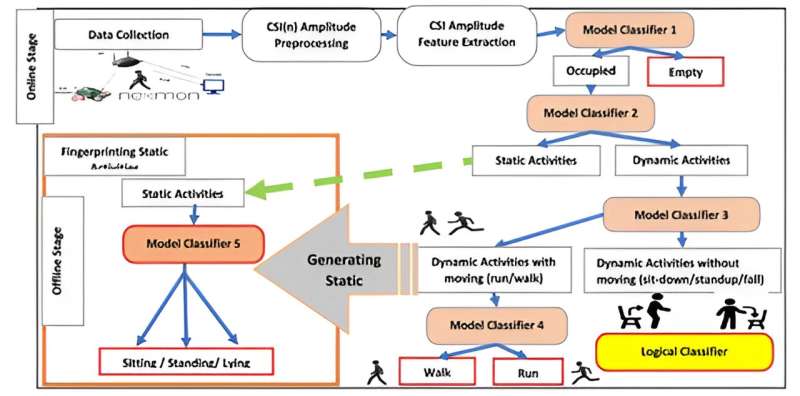This article has been reviewed according to Science X's editorial process and policies. Editors have highlighted the following attributes while ensuring the content's credibility:
fact-checked
proofread
Deep learning-enabled system surpasses location constraints for human activity recognition

In a new study published on 14 October 2023, in the journal Human-Centric Intelligent Systems, researchers from University Teknikal Malaysia Melaka (UTeM), have unveiled a novel approach to Human Activity Recognition (HAR) that transcends traditional limitations.
This cutting-edge system utilizes Channel State Information (CSI) and advanced deep learning techniques, offering a location-independent, accurate, and flexible solution for activity recognition.
The research team's innovative approach leverages CSI—a vital indicator of wireless communication channel states—in conjunction with Long Short-Term Memory (LSTM) networks, a form of deep learning adept at processing sequential data. The development of this innovative Human Activity Recognition (HAR) system encompassed several pivotal phases.
Initially, data collection and preprocessing were conducted using Raspberry Pi 4 and specialized firmware to gather raw Channel State Information (CSI) data, which was then refined via MATLAB for superior quality and applicability. Subsequently, Long Short-Term Memory (LSTM) networks, celebrated for their adeptness in processing temporal data, were utilized for extracting crucial features from the CSI data, thereby enabling the accurate recognition of complex human activities.
The LSTM model underwent a rigorous training and classification process, which included an online phase for pattern recognition and an offline phase for enhanced performance, allowing the system to categorize human activities into dynamic and static types, and further into more specific subcategories. Demonstrating exceptional proficiency, the system achieved an impressive 97% accuracy rate in recognizing human activities and showcased its capability to adapt to new environments, marking a significant advancement in HAR technology.
This system represents a major stride in the field, overcoming the limitations of traditional methods by providing a flexible, precise, and location-independent solution, thus redefining the standards for activity recognition technologies.
This versatile technology has broad applications, enhancing smart homes with discreet monitoring that respects privacy, transforming health care by offering detailed, ongoing analysis of patient activities, and improving human-computer interactions in the Internet of Things (IoT) for more intuitive systems.
Its standout feature is adaptability, seamlessly fitting into various environments without needing retraining or significant adjustments. This flexibility positions it as a practical solution across multiple sectors, effectively responding to diverse real-world needs.
More information: Fahd Abuhoureyah et al, CSI-Based Location Independent Human Activity Recognition Using Deep Learning, Human-Centric Intelligent Systems (2023). DOI: 10.1007/s44230-023-00047-x



















